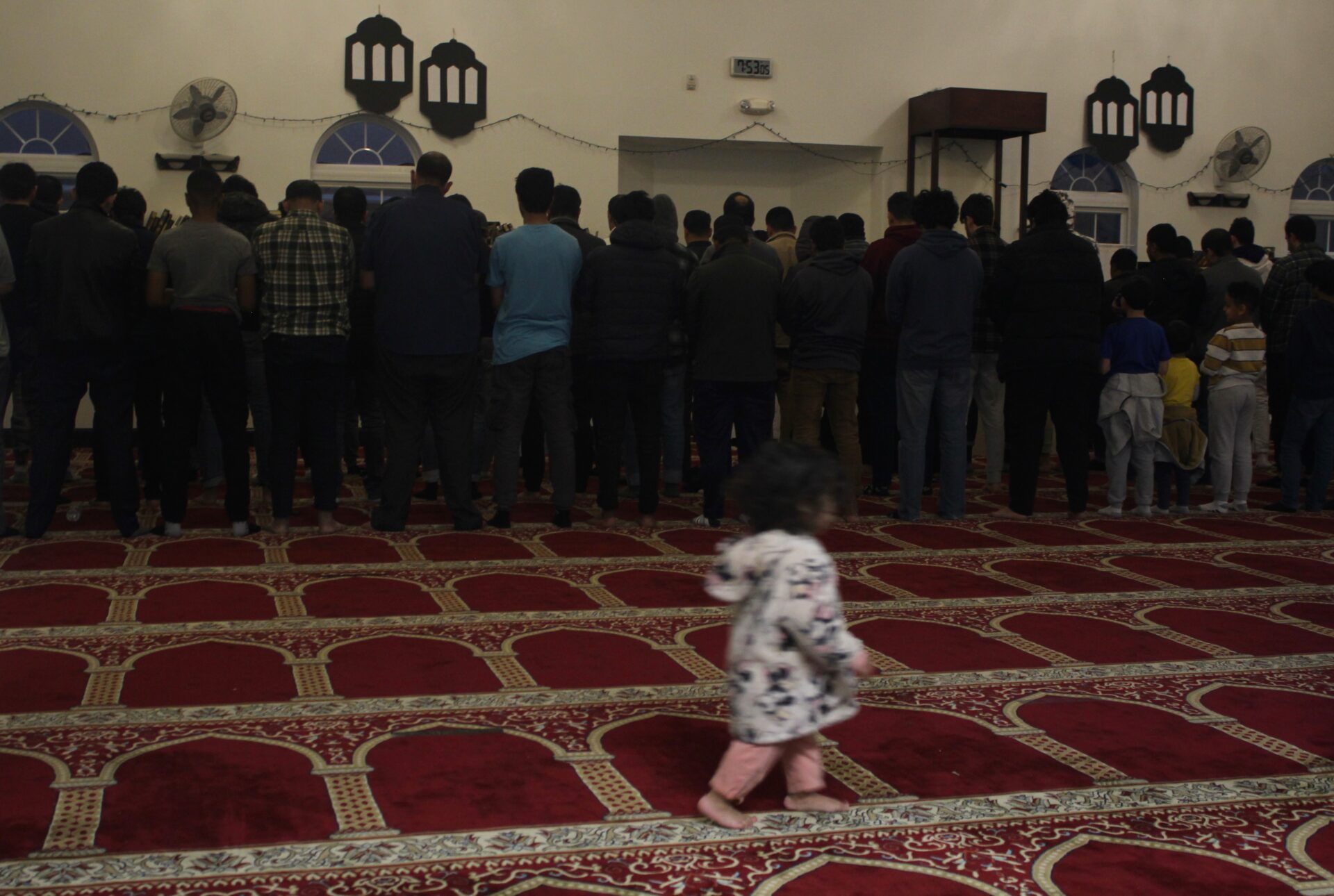Tuesday marked the end of the holy month of Ramadan in the Islamic faith. Like millions across the world, Muslims in West Virginia fasted from sunup to sundown each day of the month. Their fast is traditionally broken with a meal called iftar.
Just after sunset on a recent Sunday evening, the small lot in front of the Islamic Center of Morgantown was double parked with cars. Inside, men sat on the floor eating and drinking, and the sound that dominated the room were the yells of children.
Omar Yacoub said that’s because the men have not eaten or had water since before sunrise, more than 12 hours ago, and are focused on getting something into their system before the evening prayer. The kids, who are not required to fast, have plenty of energy.
“Today’s just a typical day, people get together here before the evening prayer, which is the prayer, whenever we hear the call for it, we break our fast,” Yacoub said. “We just eat a date and probably a cup of water, and then pray and then go back to eat something that’s a little bit heavier.”
Yacoub is a volunteer at the Islamic Center. Muslims pray five times a day, and having memorized the Quran, he sometimes leads the prayer on nights like tonight when the mosque’s imam is not present. Yacoub said fasting and the month of Ramadan serve many purposes. For example he is taking the opportunity to review some of his Quranic verses.
“It can be self discipline and self control, teaching yourself that there are a lot of other things that you might think you cannot do but you can actually do, like fasting,” Yacoub said.
Prayer and fasting are two of the five pillars of Islam, which include the Hajj, a pilgrimage to the holy city of Mecca, and declaring one’s faith. Yacoub said fasting can help motivate the fifth pillar, giving to charity.
“It also helps you get the feeling of those families in need, those families who can stay for hours and hours without the ability to drink or eat anything,” he said. “That gives you a little bit of motivation, a little bit of a push forward to giving charity, to donate money to these families in need.”
Credit: Chris Schulz/West Virginia Public Broadcasting
Ultimately the focus of Ramadan is personal, but breaking fast is often a communal experience. And after the evening prayer, the congregants return to the common room to eat a proper meal.
At the Islamic Center, each night is sponsored by a different family or families. The people that make up the mosque’s community are incredibly diverse, representing dozens of countries from Libya to Bangladesh and, of course, the United States, which means each iftar can vary, but is always delicious.
“We all share the same thing,” said Mohamed Hefeida, one of the sponsors of tonight’s iftar. “We fast the same, we made the same food. Again, alhamdulillah, it’s five different families making them. Everybody did the chicken in a different way.”
Hefeida said he got up at 1 a.m. to start cooking, but the effort is worthwhile because breaking fast and praying together as a community reminds him of the reason for Ramadan and fasting: to reset his perspective on what matters.
“To me, it means that I belong to a larger, multicultural, very diverse group of people,” Hefeida said. “We share very common, root human aspects like hunger and thirst. And that’s kind of going back to the basics. When I say I’m hungry, I’m really hungry, when I say I’m thirsty it becomes real thirst. It just makes you appreciate everything that you have so much more, because you kind of reset your reference points for everything.”
Hefeida said this year the community is making a conscious decision to keep their iftars simple. Tonight’s meal consists of staples like chicken, rice, and salad. With the war in Gaza stretching through the month of Ramadan and creating famine conditions for Muslims in the region, he said anything else felt inappropriate.
“I think it’s just the minimum we can do is kind of remember our brothers and sisters so that we could act differently because I don’t think it’s right, when people are dying from hunger for us to bring the fancy dinners on,” Hefeida said. “That’s the bittersweet. We’re still able to enjoy our meal but we’re trying to keep it simple so that we could relate to them as much as we can.”
Credit: Chris Schulz/West Virginia Public Broadcasting
Omar Ibraheem is the president of the Muslim Student Association at West Virginia University. He said the organization petitioned the mosque to hold community events like tonight’s iftar because of their importance to students that are away from home for the holy month.
“It’s such an important thing that mainly college students depend on when you don’t have your family here to iftar with, you also need that sense of community,” Ibraheem said. “We have families that come in and just you create this very important sense of community that we really prioritize in Ramadan.”
Nada Mikky is the secretary of WVU’s Muslim Student Association. She said she was raised to view Ramadan as a time for community and charity.
“We spend maybe enough time with our family throughout the year, where Ramadan is more focused on community and unity and the broader image,” Mikky said. “Back home, for example, it’s the time where people go to even people that they don’t know, to take care of them and check on the poor, if they need anything, send them food, something, send them money.”
Mikky views fasting from sunrise to sunset as a meditation in patience and the transient nature of life, a reminder that all things in life – good or bad – come to pass in their time. She tries to apply this to difficult situations, like the ongoing conflict in Gaza.
